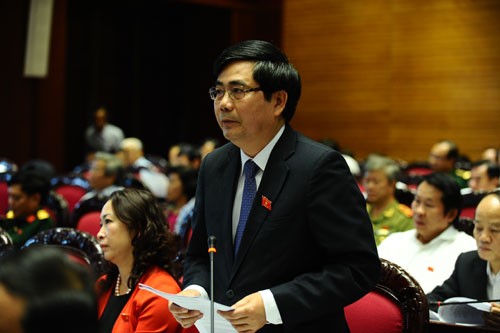(VOVworld) – The National Assembly spent a day and a half discussing socio-economic performance on Thursday and Friday. Deputies agreed that the government should pay more attention to tapping the potential of Vietnam’s best sectors and fields to achieve sustainable growth, in addition to a prompt promulgation of policies on macro-economic management.
 |
| Minister of Agriculture and Rural Development Cao Duc Phat presented a report on Oct 31, 2014 |
Vietnam is a populous country with an abundant workforce, where agriculture is a pillar of the economy. Increasing labor productivity, boosting agricultural development, and devising appropriate mechanisms to develop key economic zones across Vietnam is a strategy designed to maximize Vietnam’s development.
Focusing on population and human resource solutions
Vietnam is in the period of golden population structure with a high rate of employment. This is a great opportunity for Vietnam to accumulate resources for the future. National Assembly deputies agree that the government should devise specific ways to exploit Vietnam’s abundant human resources, further reduce the unemployment rate, and combine economic and labor restructuring to create added values and increase labor productivity. Nguyen Phi Thuong, a Deputy from Hanoi, said increasing labor productivity is vital to sustainable growth and greater competitiveness with other countries. But, he added, the Vietnamese workforce, despite its abundance, is largely untrained. Outdated technologies are contributing to this problem. Deputy Nguyen Phi Thuong suggests 3 solutions: improve training and reform the education and training system; restructure non-agricultural sectors and provide workers with necessary skills; and increase investment in science by importing modern equipment and technologies.
Nguyen Thien Nhan, a Deputy from Bac Giang province said that a country’s labor productivity represents all sectors of the economy, so to increase overall labor productivity, it’s necessary to boost that of every single sector be it agriculture, industry, construction, or service. It’s estimated that the industry sector’s labor productivity in 2014 was 4.8 times that of the agriculture sector, while the labor productivity of the service sector was 3.5 times higher. Nhan said: “Farmers should ally with export businesses to increase product competitiveness and export value. This model of cooperation will benefit both.”
Encouraging agricultural development
Le Dinh Khanh, a deputy from Hai Duong, said it’s important to increase investment in agriculture because agriculture remains a pillar of the economy. He recommended the NA and Government allocate sufficient funds for the study of new plants and animals to become independent of foreign resources.
Do Ngoc Nien, a deputy from Binh Thuan, proposed that the government exploit Vietnam’s advantages in aquaculture because there is abundant unused land along the coastline.
Tran Quoc Tuan, a deputy from Tra Vinh, said the government must vigorously promote agricultural reform. In the short term, it’s important to rezone unproductive rice fields to grow other plants and adopt advanced farming technologies from other countries. Minister of Agriculture and Rural Development Cao Duc Phat said: “We have to continue improving the productivity of rice fields by teaching farmers to use new techniques in production. The agricultural sector has encouraged large scale husbandry and provided incentives for household production. The sector has continued to help fishermen invest in off-shore fishing by providing them with technology to increase the value of their catches. The Ministry has introduced new iron-clad fishing ships and localities have asked banks to finance fishermen.”
Special policies to develop economic hubs
Vietnam has identified 20 cities and provinces as key economic zones. Measures to enhance inter-regional cooperation have brought about positive results and promoted localities’ advantages in industry, agriculture, and services. But there has been a lack of appropriate policies to help localities become economic locomotives. Nguyen Thi Nghia is a deputy from Hai Phong. “The government should strengthen inter-regional connections and promptly adjust policies to meet local requirements. The purpose of regional connection is to form economic hubs as locomotives for regional development. The government should create more effective policies to help localities make development breakthroughs.”
Sustainable socio-economic development depends on a variety of factors. The key tasks now are increasing labor productivity, reforming agriculture, and adopting policies that fully exploit local advantages.